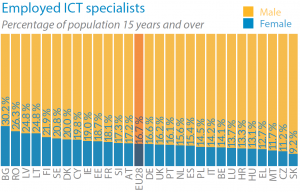As the ‘digital revolution’ expands into more areas of our lives, from the way we work, to how we consume, look after our health, learn and take part in politics, it is increasingly clear that this is not just a purely technical – or economic – process, but also a social one, and one which is not gender-neutral. Analysis of the risks and benefits finds that new information and communication technologies can be a gateway for women and girls to access new opportunities, means of expression and participation, and a powerful tool for advancing gender equality. In employment, for example, the digital sector offers highly skilled, better-paid jobs that could help to eliminate the gender pay gap. Likewise, the convergence between traditional and online media is blurring the boundaries between consumers and creators, and opening spaces for new voices, forms of awareness-raising and mobilisation – as the recent wave of ‘hashtag activism’ against sexual harassment has shown. On the other hand, if access is unequal, if algorithms or content available online are gender biased or do not reflect women’s needs and realities, or if women themselves are not involved in shaping that content, digitalisation can reinforce existing gender inequalities. It can also create new risks and barriers, not least the colonisation of online spaces by misogyny and cyber-violence.
Employed ICT specialists
Categories:
Related Articles
Visit the European Parliament page on
Visit the European Parliament page on
We write about
RSS Link to Scientific Foresight (STOA)
RSS Link to Members’ Research Service
Blogroll
Disclaimer and Copyright statement
The content of all documents (and articles) contained in this blog is the sole responsibility of the author and any opinions expressed therein do not necessarily represent the official position of the European Parliament. It is addressed to the Members and staff of the EP for their parliamentary work. Reproduction and translation for non-commercial purposes are authorised, provided the source is acknowledged and the European Parliament is given prior notice and sent a copy.
For a comprehensive description of our cookie and data protection policies, please visit Terms and Conditions page.
Copyright © European Union, 2014-2019. All rights reserved.








Be the first to write a comment.